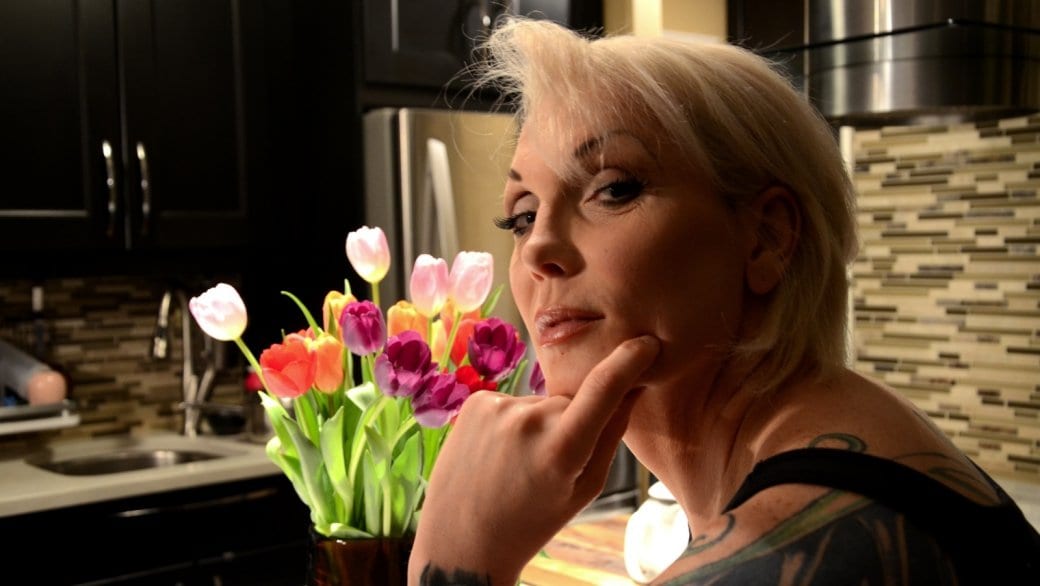As sex workers and allies prepare to share their stories in a candid new production called the Hooker Monologues, Daily Xtra asked three of the cast’s queer members to talk about their monologues, and what they hope to achieve on stage.

Esther Shannon
(Hannah Ackeral photo)
As a lesbian and a mother, Esther Shannon can understand the fear sex workers might feel when they have children that can be taken away. She still remembers how she felt when she first sent her two children to school.
“I had all these fears about being outed, like maybe my kids would be treated badly, or maybe me being a lesbian would be cause to alert a social worker. You just don’t know what potential threats you might have.”
Writing her part for the Hooker Monologues, Shannon says, “got me to thinking about the issues of sex worker mothers and how they are so deeply troubled they are at the risk of losing their children. That’s something that I have experienced.”
Shannon wasn’t always the staunch ally to sex workers that she is today. “Radical feminism has an analysis about sex work that sex workers were only victims of the patriarchy, full stop. So I was a radical feminist with that mindset,” she says.
Her monologue in the production “illustrates the possibility of someone shifting,” she says. For Shannon, that shift came from working alongside sex workers as part of a collaboration between the BC government and WISH, a Vancouver organization that aims to improve the health, safety and well-being of street-based sex workers.
“I got a really intimate understanding of what kind of issues they were advocating for and why — the decriminalization and ending the stigmatization. I just got educated,” she says.
For the last 15 years, Shannon has been working to continue that education through FIRST, a coalition of feminists that focuses on education through public forums. Working on the Hooker Monologues, she says, she sees parallels between the stigmatization queer people faced and what sex workers are going through now.

Velvet Steele
(Hannah Ackeral photo)
“For the most part, my clients always validated me and I always felt like a real whole person, but of course there was always the thing that it was private,” Velvet Steele says.
“Sometimes if I saw clients out in the real world they would look the other way, and I could never figure out if that was a result of being a woman who’s transsexual or being a service provider.”
Steele’s monologue explores the ways in which sex workers are branded. Using the process of getting ready for a client, Steele focuses on the way red lipstick is contextualized depending on who is wearing it.
“I’d always look at it and the sexuality of the fashion that people out in public were wearing, and yet for those that know what I’m doing, there seemed to be a double standard,” she says. “They’d be looking at fashion magazines and saying, ‘oh, how beautiful, I love that’ so then why was that so different for me?”
Steele was initially hesitant to join the Hooker Monologues project. Already an activist and advocate with a strong presence in the queer community, Steele wasn’t sure this would be the right platform for her.
“After some thought, I realized I do need my voice to be heard, because there was no representation of someone like me in this,” she says.
“What’s important is to listen to the voices of the frontline workers — theirs are the voices that need to be heard, that need to be taken into consideration,” she says. “I really believe that without proper representation, positive work can’t move forward.”

Afrodykie
(Hannah Ackeral photo)
Afrodykie, who asked that only her stage name be used in this story, says her monologue is dark and remorseful. She exposes what she describes as a less talked about issue for sex workers — the role of agencies, and what happens when those agencies aren’t offering the right kind of support.
“A lot of the community who are just learning about sex workers and what they’re about, they kind of assume that agencies take on this role of protectors and provide safety. And some of them do,” she says, “but a lot of them don’t. A lot of them are about the bottom line, regardless of what that might cost the individuals.”
Afrodykie is the youngest member of the cast, and is deeply involved in sex worker rights. She’s worked with WISH and an international sex workers’ advocacy network called SWAN, and contributed to research papers published by fellow cast member and Hooker Monologues co-founder Raven Bowen.
“I’m very passionate about defining the differences between sex work being a choice and sex slavery,” Afrodykie says. “I come from Haiti and my background, my past history, is that of being involved with coercion. Not necessarily sex-related, but being a child and being taken from one place to another and being told, ‘this is what you’re doing’ when actually it wasn’t.”
She hopes the Hooker Monologues inspires audience members to act. “I think we’re at a place where there’s enough people who are ready to hear what we have to say, and then do something about it afterwards. The act of doing is what I want.”
(Editor’s note: This story was corrected on March 12, 2016, to protect Afrodykie’s privacy by publishing only her stage name.)
(Hooker Monologues
Thursday, March 10–Sunday, March 13, 2016
The Firehall Arts Centre, 280 East Cordova St, Vancouver
firehallartscentre.ca/our-services/theatre-rental/the-hooker-monologues)

 Why you can trust Xtra
Why you can trust Xtra


